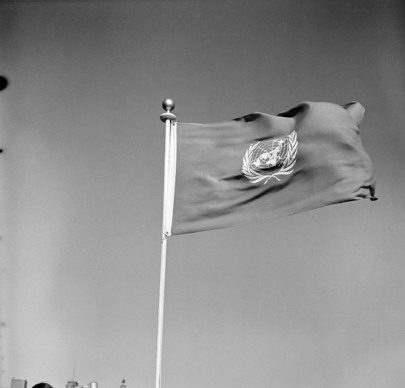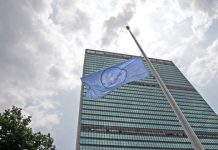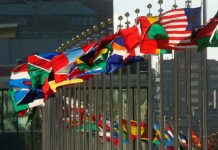UN stands with Ukrainians for the long-term, insists UN aid chief
The embattled people of Ukraine and those forced abroad need $3.32 billion in lifesaving and sustained humanitarian assistance to help them cope as a fourth year of war looms after Russia’s full-scale invasion, UN aid chiefs said on Thursday.
In a joint appeal from Kyiv, emergency relief chief Tom Fletcher and Filippo Grandi, High Commissioner for Refugees, said that millions of civilians inside Ukraine and abroad depend on the international community’s support, amid ongoing Russian attacks.
Here’s Tom Fletcher now:
“The Ukrainian people have shown incredible courage over these years and we have to respond by showing a real, genuine, sustained international engagement, we have to respond with heart. We will be here with the Ukrainian people for as long as it takes to meet these needs and to support them in this moment.”
The appeals are designed to support critical assistance to some six million people inside Ukraine – where overall needs are more than twice that number – and around two million who are living as refugees in 11 countries.
The UN High Commissioner for Refugees, Mr. Grandi, condemned the unrelenting impact of bomb blasts on frontline communities, day in, day out. People there continue to suffer destruction and deprivation in the cold of winter because of Russia’s targeting of energy infrastructure, he said.
Global economic recovery is not contributing to jobs or wages, warns UN labour agency
The global jobs gap – which is the number of people who want to work but who do not have a job – reached 402 million in 2024.
That’s according to the UN International Labour Organization, ILO, which said on Thursday that geopolitical tensions, costly climate change impacts and growing sovereign debt are putting workers under pressure.
The ILO said that young people continued to face much higher unemployment rates in 2024, while informal work and those categorized as the working poor, returned to pre-pandemic levels.
Low-income countries faced the most difficulties in creating decent jobs for their citizens, the UN labour agency’s World Employment and Social Outlook report explained.
Although the global economy continued to expand moderately last year, ILO said that workers have not recovered their loss of earnings caused by the COVID-19 pandemic – although interest rates did come down.
Real wages only increased in some advanced economies – and most countries are still recovering from the aftermath of past crises, the labour agency said.
Tropical cyclone recovery underway in Mozambique, says OCHA
To northern Mozambique, where UN aid teams are doing their utmost to provide help to communities hit by two deadly cyclones in a month.
Tropical cyclone Chido – which devastated the French territory of Mayotte in the Indian Ocean leaving thousands feared dead – hit Cabo Delgado province on 15 December, killing 120 people and injuring more than 800, after smashing into Mecufi district and Nampula province.
Wind gusts exceeded 200 kilometres per hour and left a high number of houses either partially or completely destroyed. In all, some 400,000 people were affected.
A second storm, Dikeledi, hit Nampula on Monday, killing three.
The UN aid coordination office’s Paola Emerson told UN News that 12 more named storms are predicted until April alone. She said that “food is the main concern” for people as three million are already food insecure across Mozambique:
“All month long, UN humanitarians have been providing assistance complementing government efforts. As of Saturday, the World Food Programme and its partners had reached more than 190,000 people in five districts with one week food rations. A vaccination campaign to deal with cholera was launched on 6 January and it has reached 86 per cent of the nearly 200,000 people that were targeted.”
To date, Ms. Emerson said that 109,000 people have received shelter and non-food items, including tarpaulins, blankets, ground mats and cookware, while 60,000 have received urgent medical care and disease prevention.
The UN aid official said that about 50,000 people were affected by Dikeledi storm and more than 7,000 homes were destroyed, along with 82 classrooms and 142 acres of agricultural land.
Daniel Johnson, UN News
Don’t forget that you can hear more news and interviews on the UN News audio hub now.
Music composed and produced by Joachim Harris. All rights reserved
Source of original article: United Nations (news.un.org). Photo credit: UN. The content of this article does not necessarily reflect the views or opinion of Global Diaspora News (www.globaldiasporanews.com).
To submit your press release: (https://www.globaldiasporanews.com/pr).
To advertise on Global Diaspora News: (www.globaldiasporanews.com/ads).
Sign up to Global Diaspora News newsletter (https://www.globaldiasporanews.com/newsletter/) to start receiving updates and opportunities directly in your email inbox for free.






























